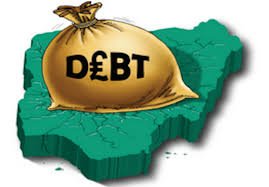Nigeria’s public debt surged to N134.3 trillion ($91.3 billion) in the second quarter of 2024, marking a 10.35% increase from N121.7 trillion ($91.5 billion) recorded in the first quarter, according to a report by Daily Query, which cited an exclusive document from the Federal Ministry of Finance.
The increase in debt was largely driven by the devaluation of the naira, though the dollar value of the debt remained relatively stable. “In Q2 2024, the debt stock grew in naira terms to N134.3 trillion ($91.3 billion) from N121.7 trillion ($91.5 billion) in Q1 2024, driven mainly by exchange rate devaluation. The dollar amount of debt was roughly the same,” the report stated.
Domestic debt accounted for 53% of the total debt, amounting to N71.2 trillion ($48.4 billion), while external debt made up 47%, equivalent to N63.1 trillion ($42.9 billion). The majority of domestic debt, around 78%, is held in Federal Government Bonds (FGN Bonds), indicating the government’s heavy reliance on the local bond market for financing. Other domestic borrowing instruments include Nigerian Treasury Bills, Savings Bonds, Sukuk, Promissory Notes, and Green Bonds, reflecting a range of public financing options.
On the external side, multilateral loans, such as those from international financial institutions like the World Bank, represented 50.4% of the total external debt. Bilateral loans accounted for 13.7%, and commercial loans, typically raised through international capital markets, made up 35.9%. This composition illustrates a balance between concessional financing options and market-based borrowing, helping Nigeria manage its debt while navigating global financial markets.
Debt servicing has become a significant challenge for the Nigerian government. Payments for servicing the debt surged by 69% in the first half of 2024, reaching N6.04 trillion, up from N3.58 trillion in the same period in 2023. This sharp increase is largely attributed to the naira’s devaluation, which has made foreign debt repayments more expensive. The growing debt service obligations now consume a substantial portion of the federal government’s financial resources, raising concerns about Nigeria’s ability to sustain its borrowing levels while managing domestic and global economic pressures.



























